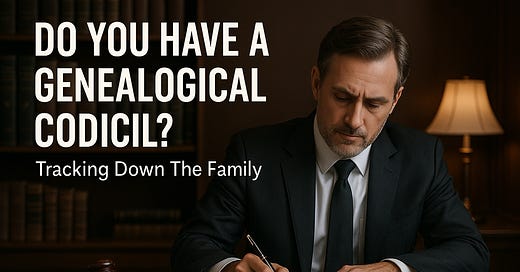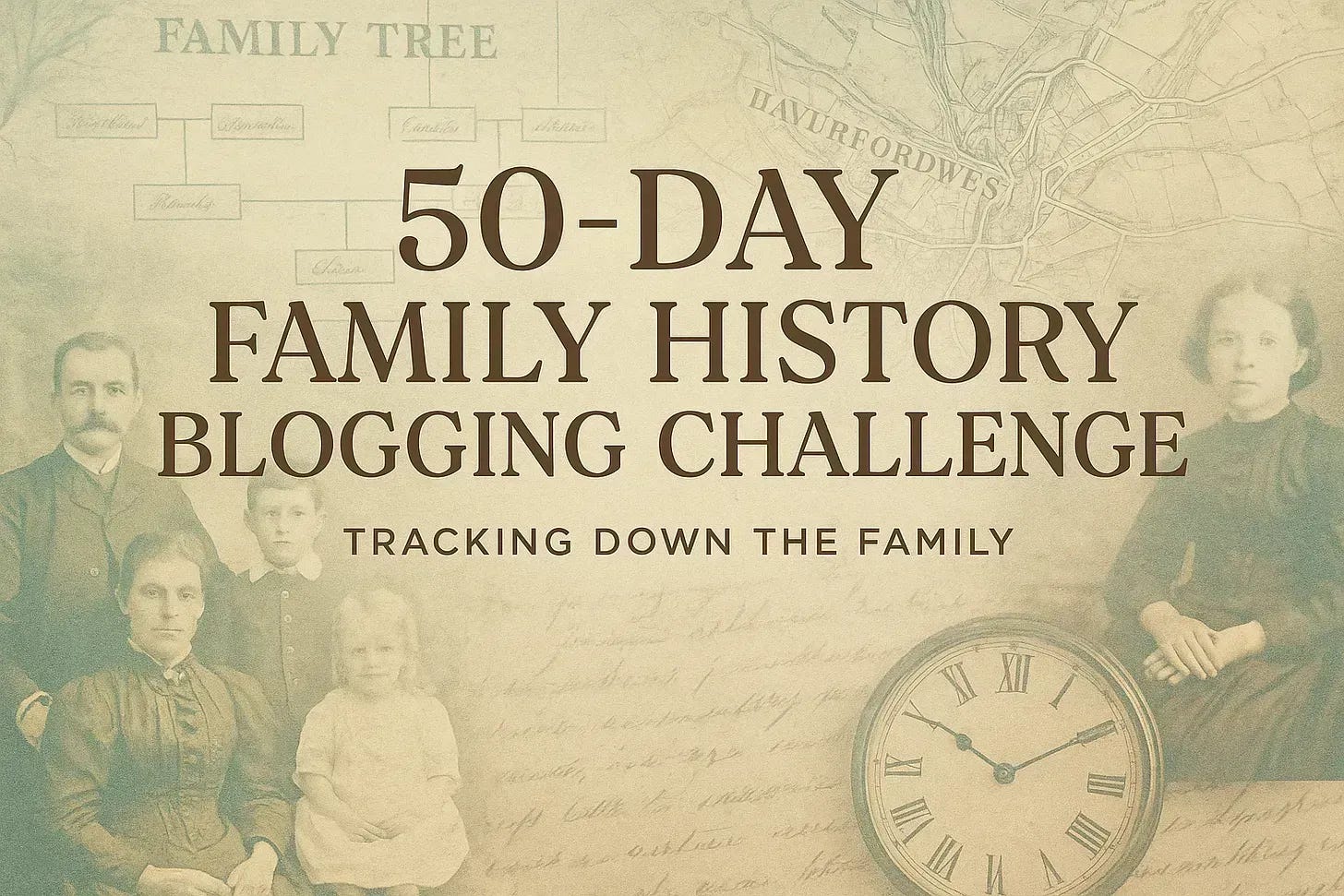Have you ever thought about what will happen to your family history research when you're no longer here to care for it? I know I think about it often. Most in my family have no interest in my research and I imagine that when I’m gone my papers will look just like that - papers to be thrown away.
Many of us who spend years or even decades researching our ancestors, building family trees, collecting photos, letters, DNA matches, and meticulously citing sources, worry about what will become of our life’s work. That’s where a Genealogical Codicil comes in.
What Is a Genealogical Codicil?
A Genealogical Codicil is a legal document, or an attachment to your will, that outlines your wishes for what should happen to your genealogical research and materials after your death. It’s a way to ensure that your hard work is preserved, respected, and passed on in the way you intend.
In legal terms, a codicil is simply an amendment or addition to a Will. So a Genealogical Codicil is an addition to your Will that specifically addresses your family history collection.
Why Create a Genealogical Codicil?
I know I spend a huge amount of time on my family history research, and I’m sure that most who read this would be doing the same. As we all know, it’s a time consuming hobby, but it is much more important than just a hobby. Without clear instructions for after your death, your family history records could end up being lost forever.
Thrown away or destroyed by someone who doesn’t understand their value
Split up and scattered among relatives
Lost in the shuffle of estate distribution
Forgotten in a storage unit or attic
By creating a Genealogical Codicil, you can:
Name a custodian: Someone who understands the value of your research and will continue to preserve or share it.
Direct where your materials should go: Whether that’s a family member, local historical society, genealogy group, or archive.
Preserve digital and physical files: From Ancestry trees and research databases to binders, letters, photographs, or heirlooms.
Leave instructions for publication or sharing: You might want your research to be made public, published online, or gifted to a specific library or archive.
What Can You Include in a Genealogical Codicil?
Your codicil can be simple or detailed. Here are some common elements:
Name of the person you wish to handle your genealogy (your "genealogy executor")
List of materials to be preserved (binders, digital files, books, heirlooms, DNA results, etc.)
Instructions on storage or donation (e.g., “I wish my family history binders to be donated to the (name) Local History Society.”)
Access details for online trees and accounts (ensure passwords are stored securely, possibly in a separate digital legacy tool)
Permission for publication or distribution
Legal Considerations
Although a codicil can be a standalone document, to be legally valid and enforceable it must generally meet the same standards as a Will in your jurisdiction. That usually includes:
Being signed and dated
Witnessed by two people who are not beneficiaries
Ideally prepared or reviewed by a legal professional
You can also store a copy with your Will, share it with your chosen genealogy steward, or include it with your research materials.
Preserving a Legacy
As family historians, we see ourselves as custodians of the past, but we must also think about being stewards of the future. By creating a Genealogical Codicil, you ensure that the stories you have uncovered, the connections you have made, and the records you've collected will live on beyond your lifetime.
A Genealogical Codicil is a gift to your desendants.
If you're interested in creating your own Genealogical Codicil, I’ve included a sample codicil below that can be adapted to your own situation.
An Example of a Genealogical Codicil
GENEALOGICAL CODICIL
TO MY LAST WILL AND TESTAMENT
To my spouse, children, guardian, administrator and/or executor:Upon my demise, it is requested that you DO NOT dispose of any or all of my genealogical records, both those prepared personally by me and those records prepared by others which may be in my possession, including, but not limited to books, files, notebooks or computer programs for a period of two years.
During this time period, please attempt to identify one of more persons who would be willing to take custody of the said materials and the responsibility of maintaining and continuing the family histories. (If you know who within your family or friends are likely candidates to accept these materials, please add the following at this point: “I suggest that the persons contacted regarding the assumption of the custody of these items include but not be limited to” and then list the names of those individuals at this point, with their addresses and telephone numbers if known).
In the event you do not find anyone to accept these materials, please contact the various organizations that I have been a member of and determine if they will accept some parts or all of my genealogical materials. (List of organizations, addresses and phone numbers at bottom; include local chapters, with their addresses, phone numbers and contact persons if available as well as state/national contact information and addresses).
Please remember that my genealogical research consumed a great deal of time, travel, and money. Therefore it is my desire that the results of my research be allowed to continue in a manner that will make them available to others in the future.
Signature____________________________Date______________________
Witness_____________________________Date______________________
Witness_____________________________Date______________________
Have you made plans for your genealogy research?
I’d love to hear your thoughts. Do you have a designated family historian? Have you donated or archived your work? have you even considered what will happen to your research after your death. Feel free to share in the comments.
And if this post resonates with you, please share it with fellow researchers, so we can help each other protect our precious family stories.
Further Reading:
Genealogical Codicil to Last Will and Testament
Family Tree Magazine - Preservation
The Legal Genealogist Judy Russell
Genealogy Gems - Lisa Louise Cooke
Day 8/50: 50 Day Family History Blogging Challenge






Never even thought about this! It's great that family wants to know who was who and what happened when but that genealogy executor might be difficult to find. Thanks for the insights and advice.
Not something I have done ... Yet. Certainly good advice!